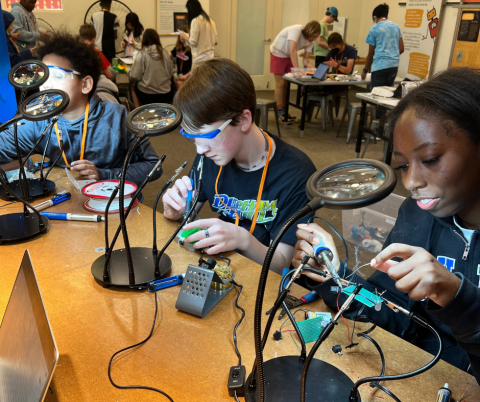Improving Students' STEM-Identity Through Design and Tinkering (2024-2025)
Background
The Research Triangle ranks 6th in STEM employment in the U.S., but many North Carolina K-12 students lag nationally in science and math, hindering their access to local STEM jobs. In parallel, Black and Hispanic workers remain underrepresented in STEM, comprising only 5% and 9% of engineering jobs. Females make up 50% of all STEM jobs but only 15% of engineering positions. The intersection of these groups remains largely understudied in terms of its impact on individuals’ presence and retention in engineering.
There is a critical need to positively influence students’ life trajectories through culturally responsive learning environments. Advancing Excellence in P-12 Engineering Education (AE3) is a set of standards and design objectives that have been shown to improve racial and gender minorities’ engagement in STEM and identity development. Notably, North Carolina and Florida are the only states lacking engineering standards, limiting these experiences for students.
Engineering outreach programs offering exploratory learning and mentoring can mitigate this gap. When successful, such programs can foster 21st-century skills and enhance engagement in societal issues. However, research on optimizing these experiences is severely underexplored. Informal education partnerships between science-rich institutions and communities can more swiftly incorporate AE3 principles compared to formal education settings, serving as test beds to enhance STEM learning and widen participation.
Project Description
This project team will provide validated and equitable hands-on engineering education that enhances adolescents' self-efficacy as community-focused engineers. While many studies discuss barriers for racial and gender minorities in science, few explore how this impacts innovation. Encouraging local problem-solving by students can lead to practical solutions and foster an engineering identity.
The 2023-2024 project team is developing an initial theoretical framework and collecting descriptive and correlative research data about a middle and high school engineering experience called Ignite. This data covers STEM engagement, self-efficacy and student resilience. It forms the basis of this project’s hypothesis and experimental research. In 2024-2025, team members will refine the framework and create and implement a robust experimental intervention for the next cohort of Ignite. This will generate insights that impact both Ignite's future delivery and the broader field of engineering education.
In Fall 2024, team members will familiarize themselves with the current curriculum and data from the Ignite implementation to formulate a hypothesis on the program’s impact on students. Based on these results, the team will work with collaborators at the Durham Museum of Life and Science to co-develop Ignite Generation 2 (Ignite Gen2), which will include approximately 60 middle school and 20 high school students in Durham.
In Spring 2025, the 8-week program will include a multi-modal virtual curriculum, three structured weekend trips to the Museum for hands-on learning, and a conference at Duke where prototypes are presented and final metrics are collected. Students choose one of three design-based courses centered around North Carolina-specific challenges related to the UN Sustainable Development Goals. Ignite Gen2 will include new elements added to this program to introduce research variables, such as the effect of team-based learning, targeted material or iteration in design.
Anticipated Outputs
Engineering education framework; curricula; engineering outreach program; data repository; peer-reviewed manuscript; conference presentations; data for grant applications
Student Opportunities
Ideally, this project team will include 2 graduate students and 8 undergraduate students with interests in STEM fields, education and/or psychology and human subjects research.
The team will break into two subteams focused on intervention and metric development. Subteams will meet weekly to allocate tasks, discuss deliverables and apply methods to their specific projects. In Fall 2024, the team will meet on Tuesdays and Thursdays from 3:05-4:20 p.m.
Students will perform research based on education methodologies, create and refine existing curricula, and design collected metrics. All team members will contribute to writing, work directly with middle and high school participants and participate in weekly meetings, discussions and seminars. Students will gain experience in citation management, IRB protocol experience, data management, museum facilitation training and community engagement.
This project also includes a related Data+ project for Summer 2024; there is a separate application process for students who are interested in this optional component.
Timing
Fall 2024 – Summer 2025
- Summer 2024 (optional): Data+ students: Synthesize and apply education and psychology theory; iterate research framework and Ignite curricula
- Fall 2024: Hold outreach and Museum of Life and Science Catalyst training; seek IRB approval; pilot metric collection
- Spring 2025: Implement Ignite Gen2; collect research metrics; interview stakeholders; perform impact assessment; analyze data
- Summer 2025 (optional): Continue data analysis; disseminate findings; optimize curriculum and metrics; submit updated IRB
Crediting
Academic credit available for fall and spring semesters; summer funding available
See related Data+ summer project, Improving Students’ STEM-Identity Through Design and Tinkering (2024), and earlier related team, Ignite: Improving Students' STEM-Identity Through Human-Centered Design (2023-2024).
Image: Ignite middle school students learn to solder with undergraduate student trainer, Paula (right), by Megan Madonna

Team Leaders
- David Knudsen, Museum of Life and Science, Durham, NC
- Megan Madonna, Pratt School of Engineering-Biomedical Engineering
- Nimmi Ramanujam, Pratt School of Engineering-Biomedical Engineering
/graduate Team Members
-
Kerry Eller, Biomedical Engineering-PHD
/yfaculty/staff Team Members
-
Amy Anderson, Arts & Sciences-Program in Education
-
Karis Boyd-Sinkler, Engineering - Office of Dean
-
Bridgette Hard, Arts & Sciences-Psychology and Neuroscience
-
Timothy Holcomb, Education-Postdoc
-
Brianna Sanders, Duke Office of Durham and Community Affairs
-
Ann Saterbak, Pratt School of Engineering-Biomedical Engineering
/zcommunity Team Members
-
Museum of Life and Science
